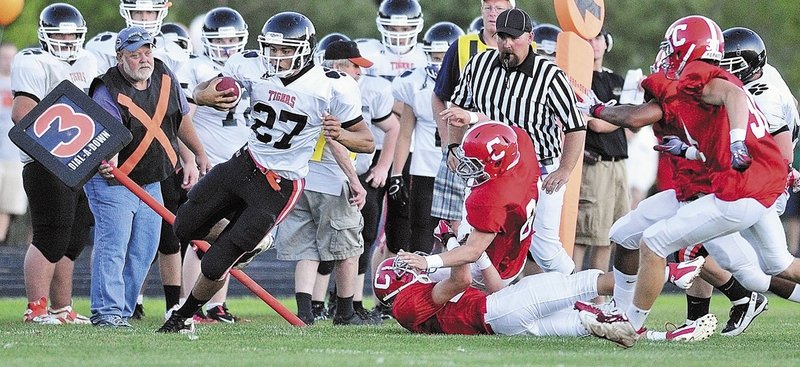GARDINER – Contact is an integral part of Andrew Doody-Veilleux’s job as an offensive tackle.
During a game in September, however, the Gardiner Area High School freshman suffered a hazard of football when a helmet-to-helmet hit left him dizzy and light-headed.
He was diagnosed with a concussion.
When he returned to school the following Monday, Doody-Veilleux still had a headache. In class his eyes started to hurt and he had trouble focusing.
His teachers were understanding and let him leave to go to the nurse’s office when necessary. He was restricted in his use of technology, so the teachers gave him alternative assignments.
“If I was in a computer class, they would let me work with a partner, and my partner could do the computer,” he said. “Without the extra work my brain had to do looking at a screen, it helps with a quicker recovery.”
Like many schools around the state, Gardiner has adopted a system of academic accommodations for students who have suffered concussions, whether through sports or incidents such as car crashes.
School staff and health professionals said that when schools began paying more attention to concussions several years ago, they focused on ensuring that injured students were ready to resume athletic activities.
In the past few years, however, that focus has broadened to encompass a full “return to function,” including a return to the classroom, said Paul Berkner, a doctor with the Maine Concussion Management Initiative at Colby College in Waterville.
“What we recognized was these students were failing in school, and the return to athletics really had to come second to a return to academics,” Berkner said.
It makes sense that a brain injury would affect schoolwork, said Nancy Dube, school nurse consultant at the Maine Department of Education.
“If it’s going to impact their understanding of how plays work, it’s also going to impact their understanding of math or literature,” Dube said.
The department has a work group on mild traumatic brain injuries that includes school nurses, doctors from the concussion initiative, athletic directors and trainers, and representatives of school administrator groups.
The work group shares information with school nurses, Dube said, including a framework developed by the concussion initiative.
The plan, which is the one Gardiner uses, consists of four stages. It starts with complete rest, including absence from school and strict limits on the use of computers, cell phones and video games.
As they recover, students can return to school but may be excused from assignments or allowed to make up tests later.
In the fourth stage, students resume all normal activities, both athletic and academic.
The timeline can vary widely among students, from a week to three weeks or more, according to Waterville High School nurse Ann Bouchard.
The concussion initiative offers grants to high schools to provide cognitive tests for their athletes.
Students take the computerized tests before the season as a baseline, and then again after an injury, for comparison. The tests assess verbal memory, visual memory, visual motor speed and reaction time to create composite scores.
“We can use them to determine how best to get them back to academics,” Berkner said.
A concussion has an impact on academics outside the classroom as well, especially for students in the midst of applying to college. If educated on the issue, medical providers can write to a college or standardized test board on behalf of a student, Berkner said.
J.P. Stowe, Gardiner’s athletic trainer, presented the academic accommodation guidelines to teachers last month after being approached by A- and B- students who were getting Cs or worse on tests.
“Some of the teachers weren’t being very accommodating, because we didn’t have these guidelines,” Stowe said.
When a student has a concussion, Stowe talks with the student’s parents, teachers and school nurse Barbara Chisholm. The guidelines ensure everyone is on the same page, he said.
In Waterville, Bouchard has similar conversations with the people involved.
“I have people call me and say, ‘We’re doing such-and-such activity, what do you think?’” Bouchard said. “Sometimes we find an alternative location or an alternative activity for that student.”
Sometimes the person who needs convincing is the student. This year, for example, one student had to miss a major pep rally because it would have been too much stimulation.
Kennebec Journal Staff Writer Susan McMillan can be contacted at 621-5645 or at:
smcmillan@mainetoday.com
Send questions/comments to the editors.



Success. Please wait for the page to reload. If the page does not reload within 5 seconds, please refresh the page.
Enter your email and password to access comments.
Hi, to comment on stories you must . This profile is in addition to your subscription and website login.
Already have a commenting profile? .
Invalid username/password.
Please check your email to confirm and complete your registration.
Only subscribers are eligible to post comments. Please subscribe or login first for digital access. Here’s why.
Use the form below to reset your password. When you've submitted your account email, we will send an email with a reset code.